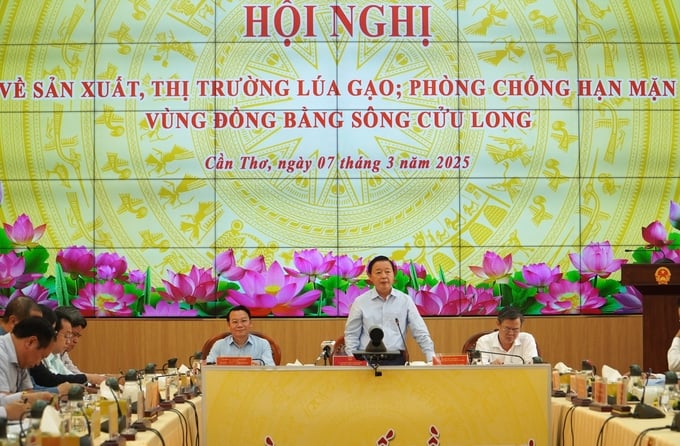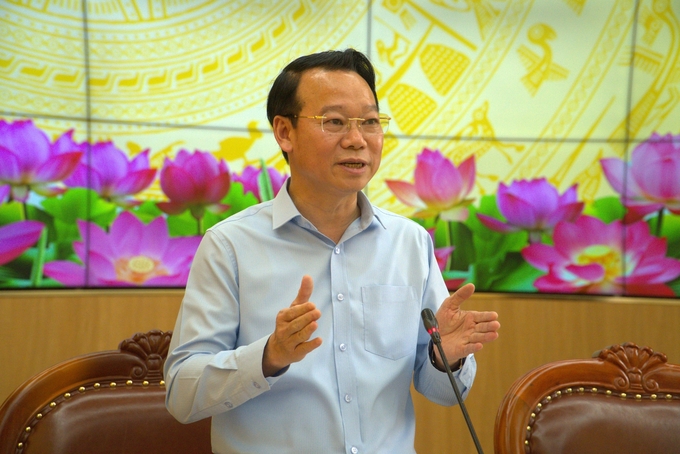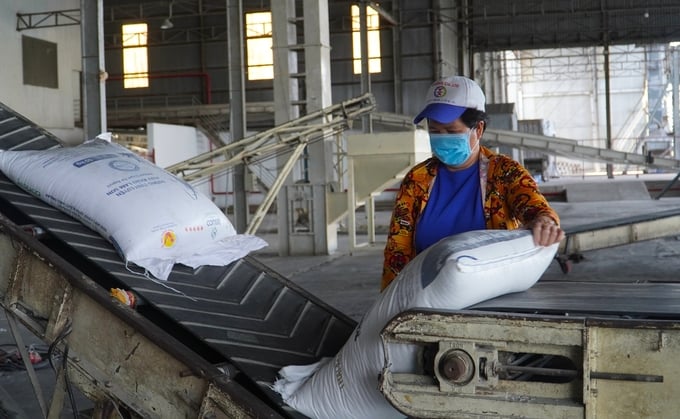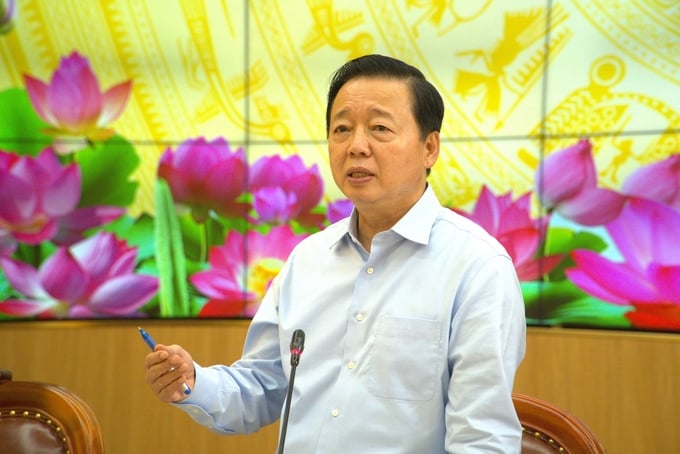November 27, 2025 | 08:48 GMT +7
November 27, 2025 | 08:48 GMT +7
Hotline: 0913.378.918
November 27, 2025 | 08:48 GMT +7
Hotline: 0913.378.918

Deputy Prime Minister Tran Hong Ha chaired a conference on rice production and consumption and the drought and saltwater intrusion in the Mekong Delta in early 2025. Photo: Kim Anh.
On March 7, in Can Tho City, Deputy Prime Minister Tran Hong Ha chaired a conference on rice production, consumption, and the drought and saline intrusion in the Mekong Delta in early 2025. At the conference were leaders of the Ministry of Agriculture and Environment and related ministries and sectors, leaders of 13 provinces and cities in the Mekong Delta, and industry associations, businesses, and scientists.
Moderating the discussion session at the conference, Minister of Agriculture and Environment Do Duc Duy commented on the situation of rice production and consumption.
He said that rice exports usually face difficulties at the beginning of the year, leading to price fluctuations. Because at this time, rice-importing countries calculate and consider between buying or selling or balancing the number of purchases for storage to change the warehouse, fluctuations in the rice market are inevitable.
On the other hand, in 2024, the rice market experienced significant fluctuations when India and Thailand temporarily stopped exporting. It led to some countries increasing their purchases for reserves due to concerns about instability, which will cause rice prices to rise dramatically, including Vietnamese rice.
Returning to the domestic market, Minister Do Duc Duy assessed that Vietnam's rice export output has remained stable for many years at around 7.5-8 million tons, without many fluctuations. On the other hand, localities have made great efforts to switch to high-quality rice (currently, high-quality rice accounts for about 80-85% of the export market share), while low-quality rice has decreased. Therefore, there have been no fluctuations in the market segment using high-quality goods, and the market using both high-quality and mid-range goods has adjusted.

Minister of Agriculture and Environment Do Duc Duy commented on rice production and consumption. Photo: Kim Anh.
Currently, Vietnam spreads crops all year round, so when difficulties arise, they can only last for about 2-3 months. If we solve the problem of purchasing reserves while waiting for the market to stabilize, we will not encounter difficulties. It is an appropriate management and response solution in the current context. Regarding the issue of rice prices falling, even falling sharply in some segments, Minister Do Duc Duy commented that rice prices are currently returning to the level of 2023, the time before the sudden price increase in 2024. Including the export price of rice, from 2022 to 2023, the average price was around USD 400 per ton. Currently, it is USD 530-540 per ton; although it decreased compared to last year, it is still higher than the price level in 2023.
However, the Minister emphasized that there should be no complacency because countries such as India, Thailand, and the Philippines are still adjusting their purchasing, including export policies. Therefore, businesses must grasp the market to closely follow the situation and adapt to the adjustments of other countries.
The core solution that the head of the Ministry of Agriculture and Environment proposed and asked delegates to focus on discussing:
The first is calculating the solution for improving the warehouse system's capacity to purchase and store during peak times.
Second, the loan quota for businesses to purchase and store reserves is currently short, and the interest rate is unattractive. Therefore, the State Bank and companies must clarify the need for credit capital to meet the current reserve capacity.

Enterprises must be large-scale, ensure capital capacity, warehouse system, and have a system of cooperatives to purchase and transport. Photo: Kim Anh.
Third is the issue of market control; according to the Prime Minister's Directive, localities must strengthen inspection and examination and strictly handle cases of taking advantage of difficult times to force farmers to lower prices.
Fourth, to stabilize the market long-term, key export enterprises must have a chain linking with farmers, from production to purchasing, milling, processing, and exporting. To form chains, enterprises must be large-scale, ensure capital capacity and warehouse systems, and have a system of cooperatives for purchasing and transportation.
After listening to opinions and discussing solutions from associations, businesses, localities, and relevant ministries, Deputy Prime Minister Tran Hong Ha said that in 2023-2024, the world market will have significant fluctuations in a direction that is beneficial to farmers and our country has made the right decisions, which is to continue exporting.
To improve market management and regulation capacity, the Deputy Prime Minister requested the Ministry of Agriculture and Environment urgently build a comprehensive specialized database system. This system will integrate information from many stages: production, science and technology, processing, preservation, market, and forecasting, to provide timely and accurate information to relevant parties.

Deputy Prime Minister Tran Hong Ha directed many important contents to improve the quality and professionalism of rice exports. Photo: Kim Anh.
Regarding export management, the Deputy Prime Minister requested the Ministry of Industry and Trade to urgently inspect and correctly assess the current situation of the domestic rice market. At the same time, Decree 107/2018/ND-CP was amended and supplemented with essential adjustments. Enterprises wishing to be granted export licenses must meet strict criteria. For example, production linkage capacity, warehouse system, and financial capacity. This solution is expected to improve the quality and professionalism of rice exports.
Giving further instructions on the issue of building and protecting the rice brand, the Deputy Prime Minister requested the Ministry of Agriculture and Environment to coordinate with the Ministry of Science and Technology to develop a strategy to prevent other countries from illegally using the Vietnamese rice brand; establish the position and protect the reputation of Vietnamese rice in the international market.
Regarding agricultural land, the Deputy Prime Minister suggested a thorough review, focusing on developing areas with high productivity and good adaptability to climate change. Localities can adjust from 3 crops/year to 1-2 crops yearly to improve production quality.
Translated by Huong Giang

(VAN) Le Hoai Trung, Member of the Communist Party of Vietnam Central Committee and Minister of Foreign Affairs, held talks with Vi Thao, Chairman of the Guangxi Zhuang Autonomous Region (China) this week.

(VAN) The Mekong River Commission adopts the 2026 - 2030 Strategic Plan with a people-centered approach.
/2025/11/26/1720-1-200855_132.jpg)
(VAN) Viet Nam and Japan have many conditions to expand cooperation on climate change adaptation, particularly in disaster risk management based on advanced technologies.

(VAN) The strong development of digital technology and artificial intelligence is opening up opportunities to transform science and technology into a 'Magic eye' for disaster forecasting and early warning.

Applying vaccines and proactive disease prevention helps pig herds stay healthy, maintain productivity, reduce risks, and decrease reliance on antibiotics in modern livestock farming.

(VAN) Many advanced agricultural technologies and products were shared at the Viet Nam - South Korea Agricultural Technology Introduction, Trade Promotion, and Connection Seminar 2025.

(VAN) Minister Tran Duc Thang hopes to strengthen connections and exchanges with China in agriculture and environment sector through the Embassy of Vietnam in Beijing.